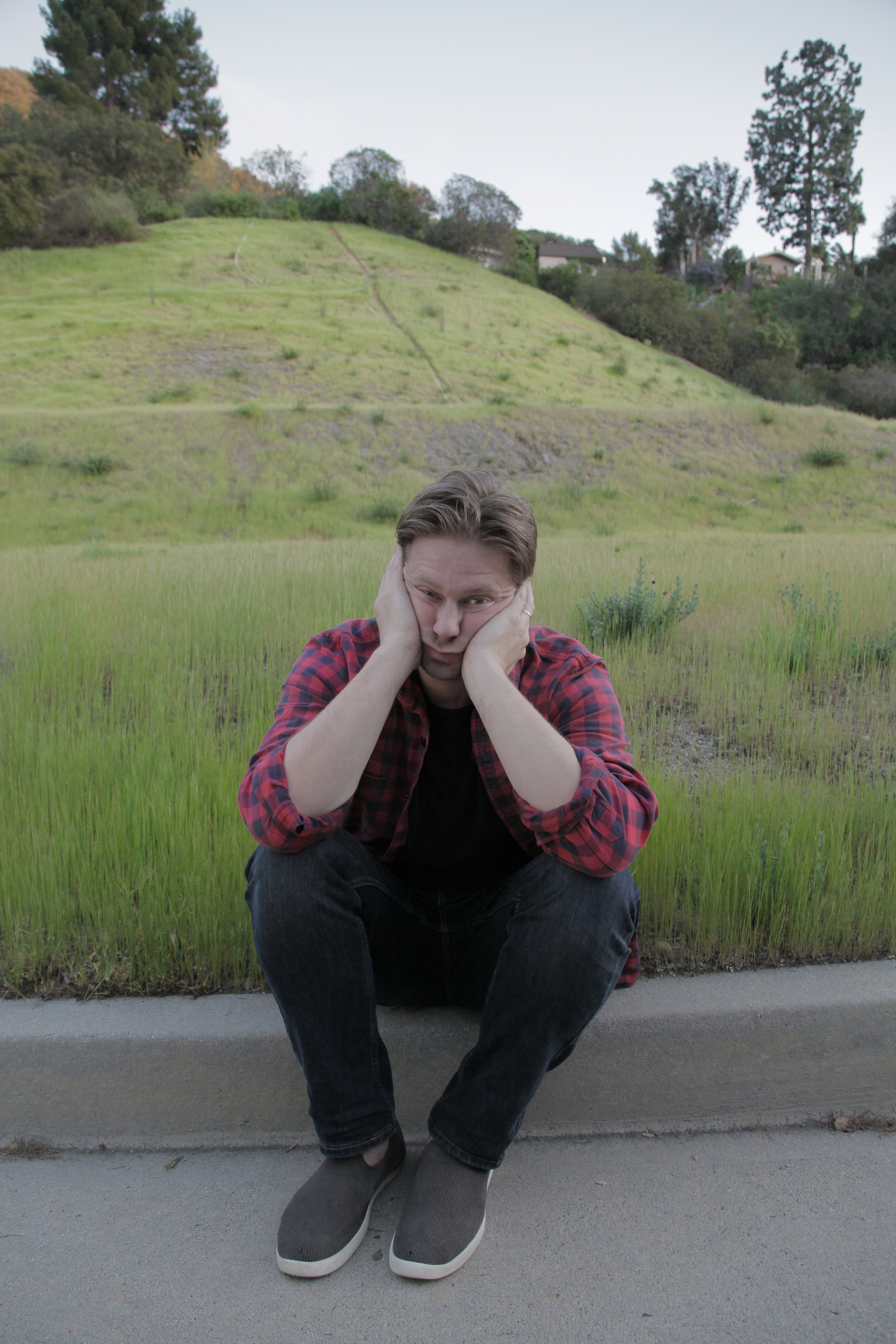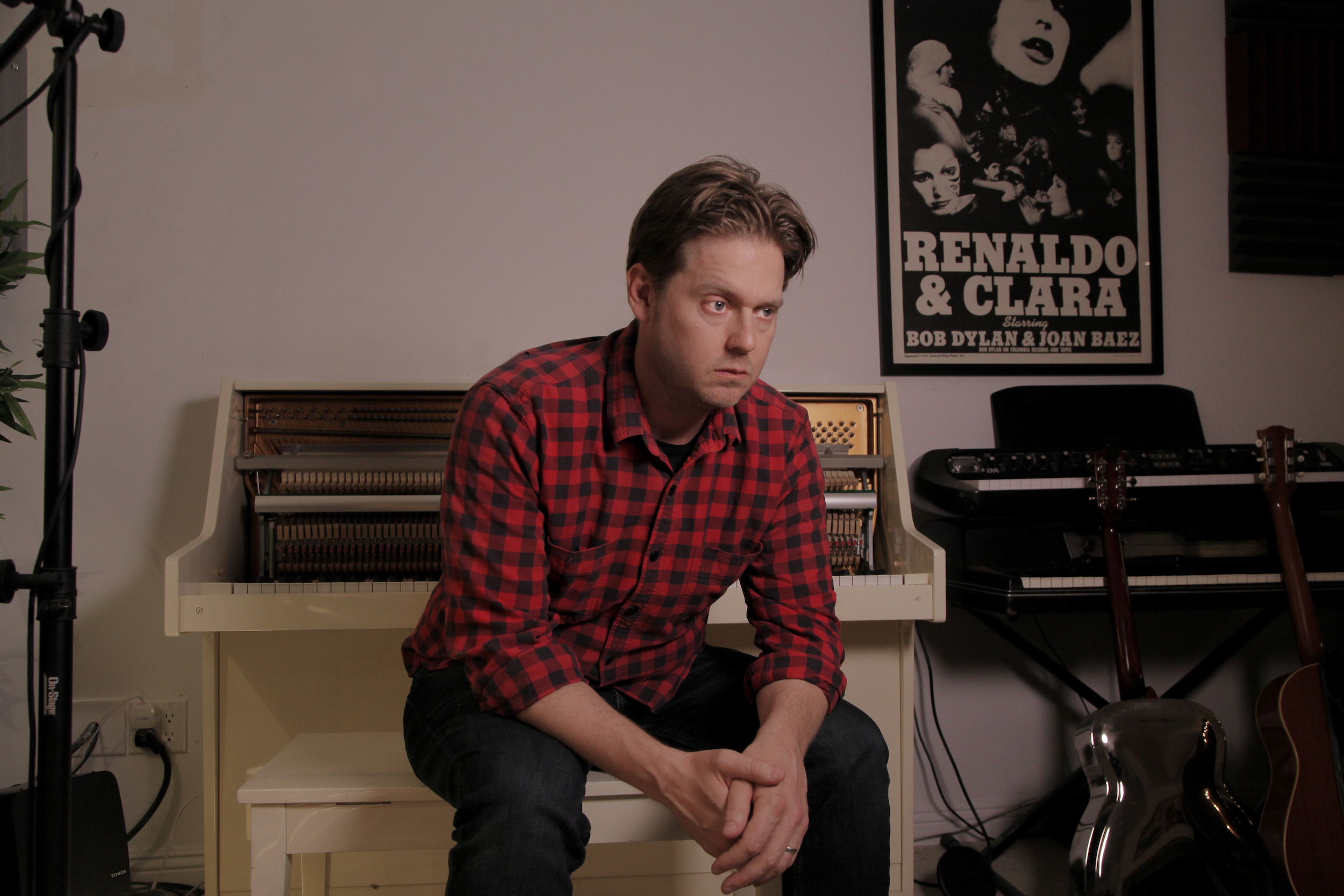Even by alternative comedy’s provincial standards, nobody does insular world-building quite like Tim Heidecker. Tim and Eric Awesome Show, Great Job!, the five-season Adult Swim sketch series he previously helmed alongside longtime collaborator Eric Wareheim, depicted an absurdist infomercial-style vision of America, one revealed through bizarre UHF-quality programming. Populated with incredibly unusual yet hideously familiar characters, the show often ventured so far leftfield that it seemed to have come from someone with complete disdain for the modern world.
“I don’t have too many passions or interests outside of my own shit,” Heidecker admits to me with a laugh.
Videos by VICE
Those enamored with the 43-year-old’s brand of comedy no doubt can relate to that sentiment, which for Heidecker extends into his parallel and no-less-niche career as a musician. His 2016 album for the Indiana-based Jagjaguwar label In Glendale served as a seemingly sincere celebration of mundane living, with its somber balladry about randomly spotting Nicolas Cage out in public and a heartland rock ode to cleaning up two different kinds of feces. Compared to the jarring gross-outs and general squishiness of Awesome Show, the album’s 70s-indebted pop-rock songs showcased a more muted humor for the most part.
“The goal was to set up the idea that I’m going to put out a record and it’s not going to be a comedy album,” he says of that project. “I felt like I laid some groundwork there— okay guys, just for a second, I’m not in leotards and lipstick.”

The predominantly domestic themes of In Glendale closely tie into Heidecker’s imminent new album What The Brokenhearted Do…. On the surface, it serves as a break-up record in the confessional tradition of Bruce Springsteen’s Tunnel Of Love or Taylor Swift’s Red. Yet, in a twist befitting his mischievous career, these eleven originals cataloging the bitterness, escapism, and heartache of divorce happen to come from a happily married father of two. “There can be some truth in these songs without it being the whole truth,” he says. “You can exaggerate it or fantasize about it a little more than to just report the news of your life.”
It is through that method that Heidecker created a loose album-length concept that, while imbued with a certain grim humor, moves him even further away from the sheer ridiculousness of his recent comedic work like Decker, an intentionally stilted send-up of network TV terrorism dramas, or his perversely combative movie reviews series On Cinema with Gregg Turkington of Neil Hamburger notoriety. Songs like “Coffee’s Gone Cold” and “I’m Not Good Enough” deliver first-person narratives decidedly unfocused on punchlines. “I hope that leads to people kind of not worrying about trying to find where the joke is and just enjoy them for the songs that they are,” he says.
For Awesome Show fans reluctant to join these earnest musical outings, the version of Heidecker represented throughout this project might seem altogether unrecognizable. A far cry from the kooky cringe of “I Sit On You,” What The Brokenhearted Do… taps into the human experience in a genuine way, revealing a depth in the songwriter that compels reconsideration. “When I Get Up,” a gleefully glum lead single about coping with depression by staying in bed, also rather unsubtly references the similarly peppy “Gotta Get Up” by the late Harry Nilsson.
Musically, the album revels almost to the point of fetishism in the aesthetic of albums like Randy Newman’s Little Criminals, Warren Zevon’s Excitable Boy, and Nilsson’s Nilsson Schmilsson. His present-day affinity for these artists comes as a byproduct of a youth spent digging in his parents’ record collection. “My dad was a big classic rock guy and he introduced me to all the greats, the Beatles and the Stones,” he says. “As I got older, the 70s singer-songwriter wave appealed to me a little more than some of the blues rock kind of nonsense of the 60s.”
With help of Foxygen’s Jonathan Rado as producer and a selection of session players, Heidecker’s songs here faithfully capture the warmth and vibes of a bygone age. “I play the song on the piano, everyone figures it out, and then we get to work on it,” he says. With a versatile combo in studio, that approach yielded a diverse set of tunes, from the plaintive “I Don’t Think About You (Much Anymore)” to the hard rock squall of “Finally Getting Over.”

Heidecker obviously benefits from a higher public profile than most indie rock acts. He’s taken to using his popular podcast Office Hours as a marketing tool for promoting the album to those already predisposed to consuming his brand of content. Co-hosted with Doug “DJ Douggpound” Lussenhop and Vic Berger IV, the more-or-less weekly program employs a live call-in format, in which fans awkwardly ask questions or otherwise attempt to curry favor with Heidecker while the team shamelessly overindulge on radio drops. There are clear nods to the farcical free-for-all feel of the old Howard Stern Show, though given Awesome Show’s penchant for showcasing Hollywood fringe personalities like David Liebe Hart and James Quall, it operates without a full-fledged “Wack Pack” to speak of. “There is some kind of structure to it,” Heidecker insists, hinting perhaps that the technical difficulties or occasional bouts of chaos may be more controlled than they appear.
Still, despite the morning show’s comedic overtones, the trio frequently digress into musical minutia, with recent topics including 1960s bubblegum popster Tommy Roe and country music star Randy Travis, along with plenty of Beatles lore. “Doug busts me cause he’s like, ‘I don’t want this to be a Beatles podcast,’” Heidecker says. “So it’s also nice to have the tension of bugging him and getting under his skin with it.”
Unapologetically intrigued by the Fab Four, Heidecker counts the group among the few pop culture touchpoints that matters to him. “When I was a kid, I became one of those guys that just bought all the books and learned everything I could,” he says. “That’s such a great entryway into all kinds of music because you read about their influences and who were influenced by them and it just turns you on to so many things.” Such self-described nerd behavior led him well into the depths of the ex-members’ solo albums and further outward into 70s soft rock. Over the course of our conversation, he name-checks session men like Jim Keltner, Leland Sklar, and Klaus Voorman.
Discussing The Beatles raises a curious parallel with Heidecker’s own career. While certainly not on the same scale, hardened fan expectations play a significant and inconvenient role, as the members’ solo outings and non-musical endeavors weren’t necessarily well received or much understood. Even after releasing more than a half dozen albums worth of original music, beginning with 2011’s soft rock outing Starting From Nowhere with composer Davin Wood, Awesome Show remains what most who know him associated him with. Most of those records, including the Trump-era political satire Too Dumb for Suicide, sought a balance between his comedic instincts and his broader artistic aspirations. “It’s sort of a check in you do throughout the process,” he says. “You just try your best to keep it on the rails.”
In the case of What The Brokenhearted Do…, a well-executed and enjoyable album that exists on its own terms, Heidecker comes closer than ever before to breaking free from beloved cult characters like Jan Skylar, Casey Tatum, and Spagett—whether his followers like it or not. Still, he feels confident that he can retain a good amount of that audience with relatively serious work. “I think there are plenty of them out there that are cool with that and can turn off the switch in their brain that makes them think about me in a certain way,” he says. “There are plenty that can accept that this isn’t just a big ol’ goof.”
More
From VICE
-

Illustration by Reesa. -

WWE -

(Photo by Simone Joyner/Getty Images for ABA) -

